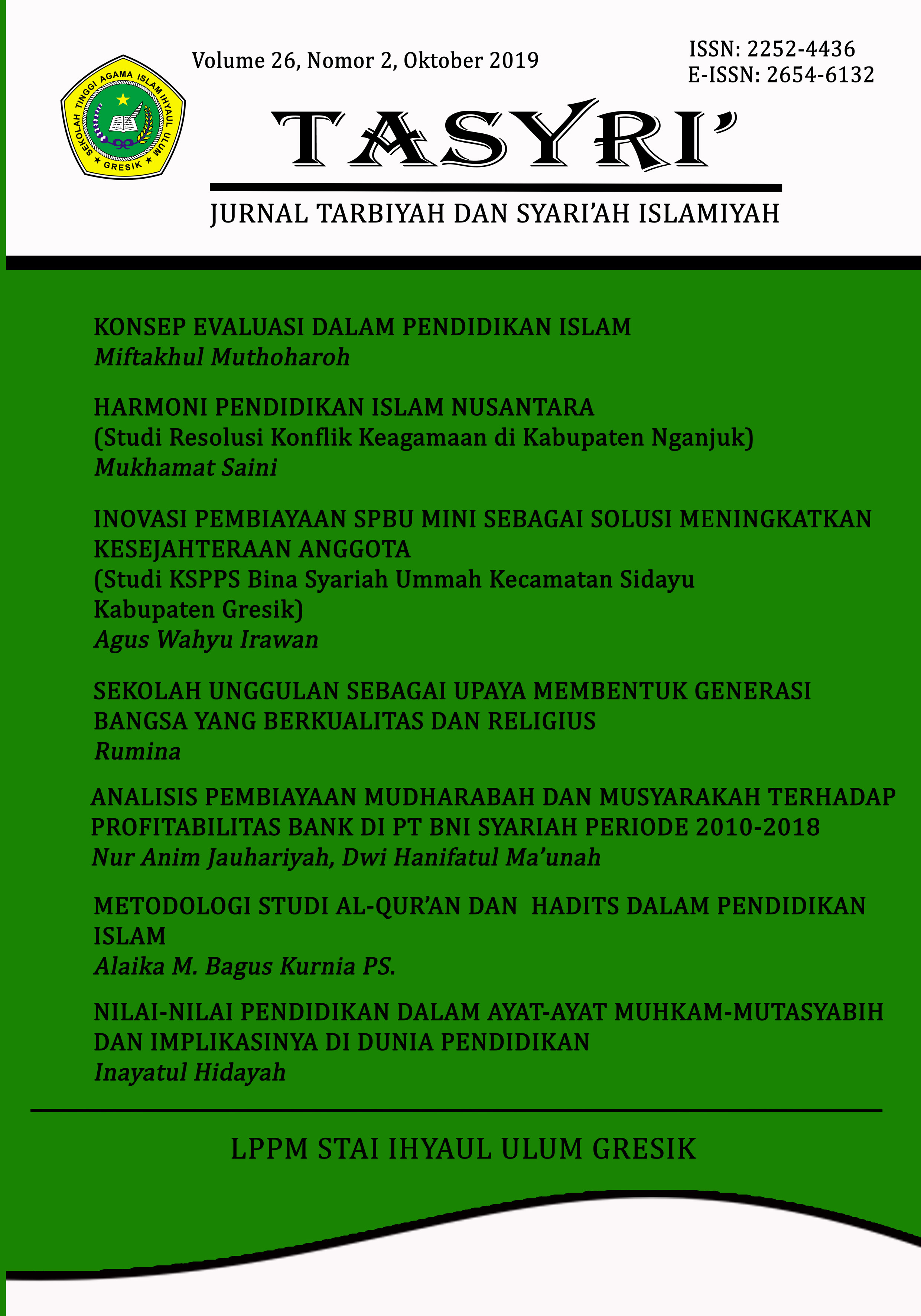Sekolah Unggulan Sebagai Upaya Membentuk Generasi Bangsa Yang Berkualitas Dan Religius
Abstract
In carrying out the development of a nation, it takes a tough and qualified and moral generation. For this reason, one way to establish a quality and moral generation requires quality education. One way that can be taken to realize these ideals is to form a superior school that is expected later with a superior school will be born of generations of people who are superior and qualified to continue the struggle and development of this beloved Indonesian Nation.
How to form superior schools that are expected to be able to produce qualified and religious national generations.
In carrying out a country's development process, it turns out to require a formidable generation physically, mentally and spiritually. Just being physically healthy does not guarantee success, and even spiritual mental health but physically fragile, and even that will result in less than perfect results of a development. And it turns out that with a superior school, it will be able to produce a quality generation of the nation both physically, mentally and spiritually. And to form a superior school itself, an educational institution, must implement its role and function as an educational institution optimally. Besides that the factors that influence the success of an institution in order to excel must be met as a whole. Because all aspects greatly influence the development of an educational institution. For this reason, optimizing all roles and functions in each element of the institution will strongly support the realization of a superior school which will produce quality and moral output.
Factors that determine the success of superior schools are internal factors that are formed from the students themselves and the external factors which include curriculum, programs, facilities, facilities and good school teachers who are able to produce generations of creative and moral personalities.
References
Al-Ghazali, Imam Abu Hamid, Tuntunan Mencapai Hidayah Illahi, Surabaya : Al Hidayah, 1997
Arifin, Anwar, Memahami Paradigma Baru dalam Undang-undang Sisdiknas, Jakarta : Depag, 2003
Asrori, A. Ma’ruf, Etika Belajar Bagi Penuntut Ilmu, Surabaya : Al- Miftah, 1999
Basrowi dkk, Sosiologi Pendidikan, Bekasi : Pustaka Ilmu Nusantara, 2010
Bina Mitra Pemberdayaan Madrasah, Profil Madrasah Masa Depan, Jakarta : 2005
Djamaluddin, Kapita Selekta Pendidikan Islam, Bandung : Pustaka Setia, 1998
Djamarah, Syaiful Bahri, Psikologi Belajar, Jakarta : Rineka Cipta, 2008
Departemen Agama RI, Al-Qur’an dan Terjemahnya, Surabaya : Mekar, 2004
Departeman Agama RI, Standar Penilaian di Kelas, Jakarta : 2003
Departemen Agama RI, Kendali Mutu Pendidikan Agama Islam, Jakarta : Depag,2001
Departemen Pendidikan Nasional, Undang-undang RI Nomor 20 Tahun 2003 Tentang Sistim Pendidikan Nasional
Ihsan, Hamdani dan Ahmad Fuad Ihsan, Filsafat Pendidikan Islam, Bandung : Pustaka Setia, 2007
Moedjiarto, Karakteristik Sekolah Unggul, CV Duta Graha Pustaka, 2002
Mukaffa, Zumrotul dkk, Micro Teaching, Surabaya : Kopertais, 2010
Nasution S, Sosiologi Pendidikan, Jakarta : Bumi Aksara, 1999
Nata, Abuddin, Filsafat Pendidikan Islam, Jakarta: Logos
Poster, Cyril, Gerakan Menuju Sekolah Unggul, Jakarta : Lembaga Indonesia Adidaya, 2000
Purwati, Eni dkk, Pendidikan Karakter, Surabaya : Kopertais, 2012
Qomar, Mujamil, Manajemen Pendidikan Islam, Malang : Penerbit Erlangga, 2007
Rahim, Husni, Arah Baru Pendidikan Islam di Indonesia, Jakarta : Logos, 2001
Rahman, M. Tohir, Terjemah Hadis Annawawiyah, Surabaya :Al- Hidayah
Saridjo, Marwan, Bunga Rampai Pendidikan Agama Islam, Amissco, 1996
Tim Penyusunan Kamus Pusat Pembinaan dan Pengembangan Bahasa, Kamus Besar Bahasa Indonesia, Jakarta : Balai Pustaka
Tjokrowinoto, Moeljiarto, Pembangunan Dilema dan Tantangan, Jogjakarta : Pustaka Pelajar
Undang-undang Dasar ’45, Surabaya : Mekar
Uno, Hamzah B, Orientasi Baru Dalam Psikologi Pembelajaran, Jakarta : 2008
Yasin, Muhamad, Psikologi Perkembangan, Kediri : STAIN Press, 2009
Zuhri Muhammad, Terjemah Juz Amma, Jakarta : Pustaka Amani, 1994
Copyright (c) 2019 Tasyri'

This work is licensed under a Creative Commons Attribution-NoDerivatives 4.0 International License.

